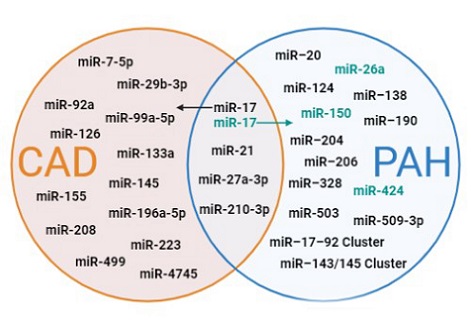Nikhil Prasad Fact checked by:Thailand Medical News Team Jun 13, 2024 1 year, 8 months, 1 week, 4 days, 2 hours, 21 minutes ago
Medical News: Heart disease and hypertension are major health concerns worldwide, affecting millions of people and leading to severe health complications. A recent study review by scientists from Medical University of Lublin-Poland that is covered in this
Medical News report, has uncovered the role of microRNAs (miRNAs), tiny molecules that regulate gene expression, in the development and progression of these cardiovascular diseases. This discovery opens up new possibilities for diagnosis and treatment, offering hope for better management and prevention of heart-related conditions.
 Comparative analysis of miRNAs in CAD and PAH: diagnostic and therapeutic potential. Note: CAD: coronary artery disease; PAH: pulmonary arterial hypertension; miR: MicroRNA; orange circle: mRNAs associated with CAD; blue circle: mRNAs associated with PAH; intersection (overlap): mRNAs shared between CAD and PAH, indicating potential roles in both conditions; black text: potential diagnostic value; green text: potential therapeutic value.
What are MicroRNAs?
Comparative analysis of miRNAs in CAD and PAH: diagnostic and therapeutic potential. Note: CAD: coronary artery disease; PAH: pulmonary arterial hypertension; miR: MicroRNA; orange circle: mRNAs associated with CAD; blue circle: mRNAs associated with PAH; intersection (overlap): mRNAs shared between CAD and PAH, indicating potential roles in both conditions; black text: potential diagnostic value; green text: potential therapeutic value.
What are MicroRNAs?
MicroRNAs are small, non-coding RNA molecules that play a critical role in regulating gene expression. They work by binding to messenger RNAs (mRNAs) and either degrading them or inhibiting their translation into proteins. This regulation is crucial for maintaining normal cellular functions and processes. In recent years, scientists have discovered that miRNAs can serve as biomarkers for diagnosing and monitoring various diseases, including coronary artery disease (CAD) and hypertension.
The Link Between MicroRNAs and Heart Disease
Research has shown that miRNAs are significantly involved in the pathophysiology of CAD and hypertension. For instance, certain miRNAs are found to be either upregulated or downregulated in patients with CAD, meaning their levels are higher or lower compared to healthy individuals. For example, miR-378, miR-196-5p, and miR-636-3p are typically downregulated in CAD patients, helping to distinguish them from those without the disease. Conversely, miR-223 is upregulated in CAD patients, suggesting its potential as a diagnostic marker.
Diagnostic and Therapeutic Potential
The ability of miRNAs to reflect disease states makes them valuable for both diagnosis and treatment. By analyzing miRNA expression patterns, doctors can potentially detect CAD and hypertension early and monitor disease progression more accurately. Moreover, miRNAs could be targeted for therapeutic interventions. For instance, therapies that modulate miRNA activity could help manage or even prevent these cardiovascular conditions.
A Systematic Review of the Evidence
A systematic review of the literature has revealed various studies highlighting the importance of miRNAs in CAD and hypertension. These studies used different methodologies and patient demographics, resulting in diverse miRNA expression profiles. Despite this diversity, t
he review underscores the significant potential of miRNAs in advancing diagnostic and therapeutic strategies for cardiovascular diseases.
Key Findings from Recent Studies
-MiRNA Profiles in Coronary Heart Disease (CHD):
A past study found that certain miRNAs in peripheral blood mononuclear cells (PBMCs) could distinguish CHD patients with heart failure from those without it. MiR-19b-5p, miR-221, and miR-25-5p, along with hypertension, were identified as independent predictors of heart failure risk in CHD patients.
https://www.ncbi.nlm.nih.gov/pmc/articles/PMC6237960/
-Hypertension and MiRNAs:
Research by Tomé-Carneiro et al. explored the effects of a resveratrol-enriched grape extract on miRNA expression in hypertensive patients with type 2 diabetes. The study found that long-term supplementation reduced pro-inflammatory cytokine expression and altered miRNAs involved in the inflammatory response, suggesting an immunomodulatory effect.
https://pubmed.ncbi.nlm.nih.gov/23557933/
-Early Detection of CAD:
Patterson et al. investigated miRNA expression in patients with and without CAD, using coronary CT angiography for classification. They found unique miRNA profiles associated with CAD, indicating the potential of miRNA profiling for early disease detection and risk stratification.
https://www.ncbi.nlm.nih.gov/pmc/articles/PMC7693112/
-Recurrent Thrombotic Events:
Kanuri et al. studied circulating miRNAs as biomarkers for recurrent thrombotic events in CAD patients. They identified a distinct miRNA expression profile associated with an elevated risk of recurrent myocardial infarction and future stent thrombosis.
https://www.ncbi.nlm.nih.gov/pmc/articles/PMC6350783/
The Role of MiRNAs in Vascular Remodeling
MiRNAs are also crucial in vascular remodeling, a process involved in the progression of cardiovascular diseases. They can either promote or inhibit this remodeling. For example, miR-126 supports adaptive remodeling by enhancing angiogenesis, while miR-155 inhibits pathological remodeling in conditions like atherosclerosis. Understanding these roles opens new avenues for therapeutic interventions aimed at regulating vascular remodeling.
MiRNAs and Pulmonary Hypertension
Pulmonary hypertension (PH) is characterized by high blood pressure in the lungs' arteries, leading to heart failure. Studies have shown that miR-150 levels are reduced in PH patients.
Research by Li et al. demonstrated that miR-150 overexpression in a rat model of PH reduced vascular remodeling and abnormal cell proliferation, highlighting miR-150's potential as a therapeutic target for PH.
https://pubmed.ncbi.nlm.nih.gov/30551428/
Conclusion
The research on miRNAs in cardiovascular diseases is still evolving, but the findings so far are promising. These tiny molecules hold significant potential for improving the diagnosis, treatment, and management of heart disease and hypertension. As research continues, miRNAs could become central to personalized medicine approaches, leading to better patient outcomes and more efficient healthcare.
Looking Ahead
Future research should focus on large-scale, longitudinal studies to validate the roles of specific miRNAs in cardiovascular diseases. Such studies could lead to the development of advanced diagnostic tools and targeted therapies, ultimately transforming cardiovascular care and improving the lives of millions affected by heart disease and hypertension.
The study review findings were published in the peer reviewed International Journal of Molecular Sciences.
https://www.mdpi.com/1422-0067/25/12/6430
For the latest about miRNAs in heart diseases and hypertension, keep on logging to Thailand
Medical News.
Read Also:
https://www.thailandmedical.news/news/thailand-medical-news-exclusive-deciphering-the-intricate-role-of-mirnas-in-heart-disorders-in-covid-19
https://www.thailandmedical.news/news/breaking-chinese-scientists-discover-that-sars-cov-2-causes-dysregulation-of-host-mirnas-and-also-produces-novel-mirnas,-resulting-in-varying-clinical
https://www.thailandmedical.news/news/breaking-news-international-study-shows-that-human-intestinal-mirnas-play-a-role-in-sars-cov-2-evolution
